Chris Baty's Blog, page 57
May 18, 2020
Fact Is Stranger Than Fiction: How to Use Historical Prompts for Your Writing
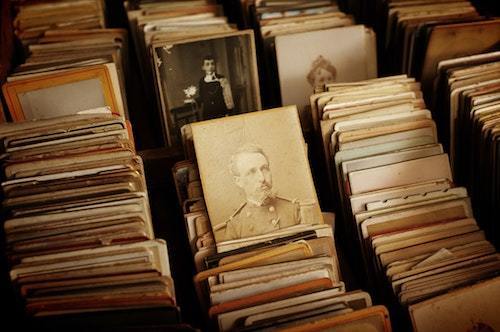
Investigating your family tree can lead you to more writing prompts that you might think! Blogger Jolie Tunnell shares her experience and advice with us today on using real people and events from the past to inspire your historical fiction:
History has a way of repeating itself. This March, I completed my second historical novel using the NaNoWriMo template. I have to admit, the excitement, sense of accomplishment, and celebration is just as fabulous this time around.
I don’t have to tell you that writing a novel in a month is one rollercoaster of a ride. Getting to “The End” is a matter of putting one word down after the other and I want to remind you of a great cheat for those times when you are terrified that you’ll run out of words.
Let me encourage you to steal your best story ideas from historical events or items from the past. They can fuel your story with plot twists, unexpected heroes, or surprising conclusions. Fact is stranger than fiction and twice as fun.
The impetus for my novel was an old stash of photographs and letters in my mother’s closet.
“That’s the couple who eloped,” she told me, “their youngest son stood trial for murder. They were homesteaders and cattle ranchers and Bible thumpers.”
But it could easily have been an antique shop perfume bottle or a sarcophagus from the local museum that caught my curiosity. There’s a story in there, somewhere, and the fun lies in teasing it out. Historical events contain multiple points of view, and the clever story-teller singles out the one worth telling.
I decided to tell that young couple’s story. Each time I came to a gap between the facts, I looked for something to bridge it. What was the political climate that year? The weather? Was there a radical current event or a mysterious secret from the past or something about to occur that affected their motives? Peruse old fashion catalogs, maps, and newspapers to spark your imagination and give you more words. Raid your grandmother’s attic.
“Historical events contain multiple points of view, and the clever story-teller singles out the one worth telling.“Halfway through my novel writing, the world outside my window began to shut down with the corona virus. It would not have affected the furious typing at my desk if not for the fact that one of my characters suddenly found himself drafted into World War I. I did not see that coming. Against my wishes, he was sent to Camp Lee, Virginia, where the Spanish flu pandemic of 1918 found him.
He died within the week.
The eerie similarities between my pages and my Facebook feed lent authenticity, color, and emotion to my pages in a big and unavoidable way. As I researched the family tree for more scenes, I came across everything from a haunted courthouse to a brothel. These are the things that keep your chapters growing, in spite of distractions, and you can use them regardless of your genre for a splash of flavor and fresh ideas.
I have a 73,600 word first draft. It’s a beautiful hot mess about my pioneer ancestors with a dynamite ending that I didn’t see coming until I was almost on top of it. Just when you think you can’t write another word, another clue inspires you onward. Sometimes it’s an ancient manuscript. Sometimes it’s a family relic. And sometimes, it’s happening right outside your window.
Whether it’s historical fiction, memoir, or humorous Erma Bombeck material, history has a way of repeating itself and the stories of the past have a funny way of resonating through our work into the present and far into the future.

Jolie Tunnell is a freelance writer, blogger, and aspiring novelist with a background that includes administration, education, and - thanks to her five kids - a sixteen year stint in the PTA. She serves up hard-won wisdom with humor, compassion and insight.
Jolie lives in San Diego, California. Visit her at JolieTunnell.com, LinkedIn, or Facebook, or be her writing buddy at NaNoWriMo. Cheers!
Top photo by Mr Cup / Fabien Barral on Unsplash
May 15, 2020
May is Asian Pacific American Heritage Month in the US! You can...
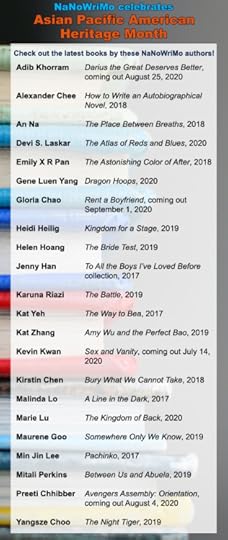
May is Asian Pacific American Heritage Month in the US!
You can learn more about it on the official website, but the quick summary of it is: “Asian Americans and Pacific Islanders have a rich heritage thousands of years old and have both shaped the history of the United States and had their lives dramatically influenced by moments in its history.”
This month, we’d like to celebrate some of the incredible Asian/Pacific American authors who have helped shape the NaNoWriMo community—from NaNo Coaches to Camp Counselors, from Pep Talkers to participants! If you’d like to support these authors, buy a copy of their latest book (or check out the e-book from your library). Links to the authors’ websites below.
Image description:
Graphic with a background of stacked books titled, “NaNoWriMo Celebrates Asian Pacific American Heritage Month: Check out the latest books by these NaNoWriMo authors!”
1. Adib Khorram — Darius the Great Deserves Better, coming out August 25, 2020
2. Alexander Chee — How to Write an Autobiographical Novel, 2018
3. An Na — The Place Between Breaths, 2018
4. Devi S. Laskar — The Atlas of Reds and Blues, 2020
5. Emily X R Pan — The Astonishing Color of After, 2018
6. Gene Luen Yang — Dragon Hoops, 2020
7. Gloria Chao — Rent a Boyfriend, coming out September 1, 2020
8. Heidi Heilig — Kingdom for a Stage, 2019
9. Helen Hoang — The Bride Test, 2019
10. Jenny Han — To All the Boys I’ve Loved Before collection, 2017
11. Karuna Riazi —The Battle, 2019
12. Kat Yeh — The Way to Bea, 2017
13. Kat Zhang — Amy Wu and the Perfect Bao, 2019
14. Kevin Kwan — Sex and Vanity, coming out July 14, 2020
15. Kirstin Chen — Bury What We Cannot Take, 2018
16. Malinda Lo — A Line in the Dark, 2017
17. Marie Lu — The Kingdom of Back, 2020
18. Maurene Goo — Somewhere Only We Know, 2019
19. Min Jin Lee — Pachinko, 2017
20. Mitali Perkins — Between Us and Abuela, 2019
21. Preeti Chhibber — Avengers Assembly: Orientation, coming out August 4, 2020
22. Yangsze Choo — The Night Tiger, 2019
May 13, 2020
Using Environment to Give Your Writing a Boost

Have your creative juices run dry? It might not be you so much as your writing environment. Whether it’s going stepping out for fresh or or even just closing a couple of extra tabs, Wrimo Ally Coy believes that a change of scenery might be just what you need to get back in the writing groove.
I stare at the cursor.
The cursor stares back at me, blinking on the page as if mocking my futile attempts at writing.
This phenomenon happens to me more than I would care to admit. As much as I would like to say that writing is effortless and I can breeze through 2k a day with no problem, that would most definitely be a lie.
Getting stuck on writing is a common occurrence, and sometimes it drives me absolutely insane. Nothing’s worse than finding yourself on a roll, only to end up at a standstill a few pages—or paragraphs—later and staring at the screen blankly like a bump on a log.
Luckily for all of us, there’s one major factor that always helps me get back into the writing groove: your writing environment!
Yes, you read that correctly. Even now, when we’re all locked away in our houses unable to get back to our regular routines, a writing environment is still an essential factor in the writing process.
Offline EnvironmentSometimes a change of scenery can do wonders for kicking writer’s block out the door. Writing at a coffee shop is a tried-and-true option for writers; I get a lot more writing done there than sitting in my room. There’s just something about the atmosphere of a bustling coffee shop paired with a caffeine boost that gets the creative juices pumping! While we’re stuck at home, even switching to writing in the kitchen rather than at a desk can work wonders.
A walk outdoors can help recharge our brains, and it usually allows me to think of ideas while getting dragged along by an overly-enthusiastic dachshund. A breath of fresh air lets us take a step back and think through plotlines (dachshund not required).
Online EnvironmentThere’s more to a writing environment than just your surroundings. A social writing environment is equally important, whether you find your friends online or offline. Having a group of writers whom you’re able to bounce ideas around and cheer each other on is a highlight of the process! If you’re still struggling to find your own squad, I’d recommend heading to the NaNoWriMo forums to find others looking for writing buddies. I found my writing squad on the Teens forum, and today they’re still some of the first people I turn to when struggling with a chapter or need to fangirl over my characters. Twitter is also beneficial in making fellow writer friends and getting involved in the community.
Online and offline, environments can have a significant impact on helping motivate us to keep writing. While we’re all typing and scribbling away, make sure to change it up every so often to keep yourself inspired!
See you at the finish line!

Ally Coy is a book blogger, BookTuber, and bookstagrammer who can be can be found geeking out over books and convincing her dorm hall to participate in NaNoWriMo. She is studying Secondary Education English and Creative Writing in Arizona and has participated in NaNoWriMo for over five years. Ally can be found at www.thenatureofpages.wordpress.com and The Nature of Pages on social media.
Top photo by Jessica Lewis on Unsplash
May 11, 2020
Mixing Fact and Fiction: Using Real Experiences as Writing Prompts
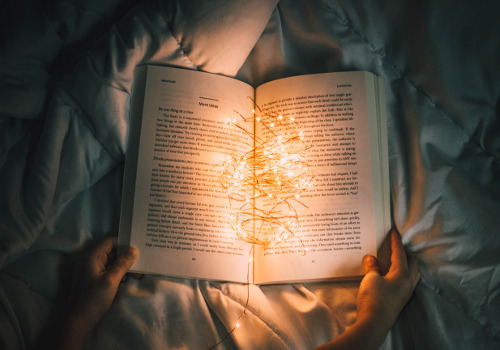
Drawing from your memories and experiences can add a personal touch to your writing, but you can take it a step further by rewriting historical events to add new twists and turns to your plot. Young writer program participant Allison is here today to tell us all about her method of mixing fact and fiction!
There’s something about a good story from long ago that fills me with smiles. A book about family, joy, lessons learned—and of course, real people and events don’t hurt. Some of my favorite books are based on the author’s actual life and experiences growing up.
Take “Betsy-Tacy” (which I am currently reading for the 4th time). Maud Hart Lovelace based the stories off of her own childhood in Mankato, Minnesota. In her beautiful stories, Maud becomes Betsy and Mankato becomes Deep Valley, Minnesota. (Speaking of Mankato, Laura Ingalls resides there for a while as well—both in her books and in reality. Mankato seems to be the spot for authors!) But back to my point: places and experiences drawn from our own experiences or from history can impact our writing so deeply.
What kind of experience, you ask, is good enough for my beautiful baby story? The answer is almost any experience. A memory of jumping on the trampoline in the backyard with your best friend with the sky blue and the grass freshly cut; the smell of the neighbors’ barbecue and the taste of summer nights in the air—what could you turn that into? How could you incorporate it into your messy, rough-draft story? Will it make it through to the final copy? (Come to think of it, will you make it through to the final copy?)
The questions an author asks themself are crucial to the book. Memories and events don’t mean anything to your reader if they make no sense. You have to be ready to give a little if you want to get a lot. Know that you might need to tweak your memory or thought (NO! Anything but that, please!) to fit it in with your story.
Another great way to enthrall your reader and add to your story is by using history. I love history. It also has some very exciting things that are ideal inspiration for a failing plot line. March on Versailles? The Bonus Army? The Roaring Twenties? How about the Ides of March? What can you add to your story that will spice it up? History is full of astounding plot twists (maybe the American Revolution) and secret villains (think Benedict Arnold) as well as great and inspiring leaders (George Washington, perhaps!). These people and events are so much fun to write about, from being subjects of a character’s social studies essay to being the time period of your entire book.
History, experiences, and memories can all play a huge part in a successful novel. What inspires you? What fascinates you? How will you make your story stand out?

Allison is from New York where she spends a lot of time reading, writing, drawing, wandering through a forest, and thinking deep thoughts. Having won a scholastic poetry contest last year, she is determined to cultivate her skills further through the NaNoWriMo YWP website. This is her first time doing Camp NaNoWriMo and her third year using NaNoWriMo.
May 8, 2020
Would You Like to Write for the NaNoWriMo Blog?
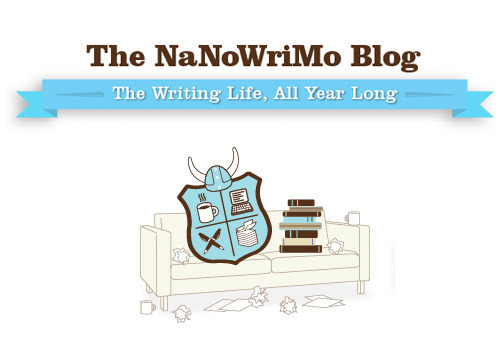 No one knows NaNoWriMo like the people who participate! We’re looking for Wrimos to contribute to our blog for some upcoming series.
No one knows NaNoWriMo like the people who participate! We’re looking for Wrimos to contribute to our blog for some upcoming series.Interested? Just fill out this form, and we’ll get in touch if we think you’re a good fit! (Please note that we receive a high volume of interest in writing for the blog, and may not be able to respond to everyone. This is currently an unpaid opportunity.)
Are you a Young Writers Program participant? Fill out this form instead so we can make sure that we attribute you correctly!
May 6, 2020
Camp NaNoWriMo 2020: Participant Survey
Thank you so much for writing with us during Camp NaNoWriMo this April! If you have a couple of minutes, let us know about your writing experience last month. Your feedback matters to us: this survey helps us improve our programs so that they meet your needs better. It also helps us see which parts of Camp NaNoWriMo are successful, and which parts could use some work. Your thoughts are always appreciated!
May 5, 2020
Teaching creative writing isn’t easy. There’s no set...
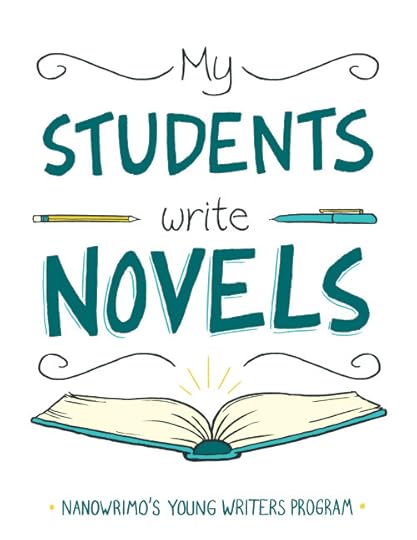
Teaching creative writing isn’t easy. There’s no set formula, no easy answers. Novel-writing is often messy, complicated, and frustrating—as well as incredibly meaningful and one thousand percent unforgettable.
This Teacher Appreciation Week, we want to take the opportunity to thank all of the educators in our community for your hard work. We see you out there, guiding wiggly fourth graders through an online writing workshop and giving personalized feedback to your high schoolers, one phone call after another. You make the world a brighter, kinder, and more creative place, and we’re so grateful for all the things you do.
With endless love and bountiful verbs,
Marya Brennan, Young Writers Program Director,
and all of us at NaNo HQ
Did you know that we supported over 7,000 classrooms on our Young Writers Program in 2019, and over 70,000 young writers worked on novels on our site? And, since our new YWP website launched in 2016, participants have written a total of 1.6 billion words! That’s a lot of new stories set free in the world!
Image description:
A vertical poster design that reads, “My students write novels” on top of an illustration of an open book with a pencil and pen on either side of the words. Below that is the text, “NaNoWriMo Young Writers Program”.
May 4, 2020
We’ve been continuing our #StayHomeWriMo prompts throughout...

We’ve been continuing our #StayHomeWriMo prompts throughout April: An initiative to support and encourage you to stay well and find comfort in creativity during these trying times. If you haven’t been following along, we’ll be sharing more of them via our NaNo Messages on the NaNoWriMo website throughout May. Today, we wanted to share some fun themed prompts that we came up to celebrate May the Fourth. May the Fourth be with you!
Image description:
A yellow and teal graphic titled “#StayHomeWriMo: May the Fourth edition”
1. Mental Well-Being: Spend a few minutes mediating. (If you need a mantra to repeat, try: “I am one with the Force and the Force is with me.”)
2. Creative Well-Being: Writing prompt: Have two characters awkwardly discover they’re related to each other.
3. Social Well-Being: Use the Force (a.k.a. a video call) to have a conversation with a friend in a galaxy far, far away.
4. Physical Well-Being: Do some quick exercises with a small and very wise Jedi on your back. No Jedi available? Try a child or a stuffed animal! (Swamp optional.)
How Physical, Mental, and Online Environments Can Influence Your Writing

Our online activity can influence our writing just as much as as our physical and mental environments. Young Writers Program participant Adrienne is here today to talk about writers can use all three types of environments to their benefit:
Every day, we’re influenced by countless things in our environment. Social media posts, our physical environment, and the people around us all impact the way we think and ultimately, the way we write. Today, I’d like to share with you three ways these things can influence your writing process, and how you harness them to become a better writer. Let’s dive in!
Online Writing EnvironmentsThe internet can both help and hinder your writing habit, whether you realize not or not. If you’re like me, you love looking around the NaNoWriMo forums for writing advice and general chat. Do you ever look at other writers on the NaNoWriMo forums and think, they’re a way better writer than I am? This negative mindset of comparison takes the joy out of writing because you feel like you can never be as good as they are.
But the truth is, there will always be people around you who are better than you at writing. Instead of just thinking, they’re better at writing than I am, start finding realistic ways to get better. For example, find writing prompts on Pinterest and just start doing it! The more you write, the better you’ll be.
When I look at it this way, the internet has really had a positive effect on my writing habit. I like to use Pinterest to create mood boards for my story and its characters. This really helps me find my vision for the mood I want to evoke when I’m writing, as well as build my characters’ personalities.
Physical Writing EnvironmentsYour physical environment also impacts your writing. For example, I have such a hard time getting words on the page when I’m writing in a noisy place, like our family living room. Instead, I like a nice, quiet writing space, like my bedroom. I keep a copy of Save The Cat nearby, just in case I need to double-check a plot point. If you’re a published author, keeping a copy of your book in sight may serve as motivation.
Another big part of our environment is sound. A lot of people like to have playlists for their writing projects, but some studies have actually shown that music decreases creativity! Isn’t that wild? If you’re one of those writers who has to have something playing, try asking your Alexa or Google Home to play ambient sounds such as a forest, ocean, or rain. A lot of music apps also have these if you just search for ‘ambient sounds’.
One thing I’ve noticed is how my writing style molds to whatever I’m reading, so I like to read a wide variety of books and articles so my writing never sounds exactly like another author’s. In art, they say, “study the masters,” and that’s very true for writing as well. If you want to be a great writer, study great books. Read bestsellers and try to understand why they sold so well.
The people around us play a great role in our writing as well. I often find that when I hang out with my writer friends, I feel more motivated to write and I hit my word count goals quickly and easily. And sometimes, it’s really helpful to have one person give me honest feedback on my writing so I know what works and what doesn’t.
I hope this gave you fresh insight into what might be influencing your writing, and maybe inspire you to chip away at your writing project today! Happy writing, Wrimos!

Adrienne is a writer, videographer, and artist from Florida who is currently writing her first novel. Her favorite place to write is in her swing outdoors, and she would love to be a National Parks ranger when she grows up! When she’s not writing, you can find her hanging out with her hamster or making animations with her American Girl dolls for her YouTube channel, Tangerine Tundra AG. You can also find her on her blog, The Periwinkle Papers.
Top photo by Kinga Cichewicz on Unsplash
May 1, 2020
“Writing a novel seems to me like swimming across a giant body...
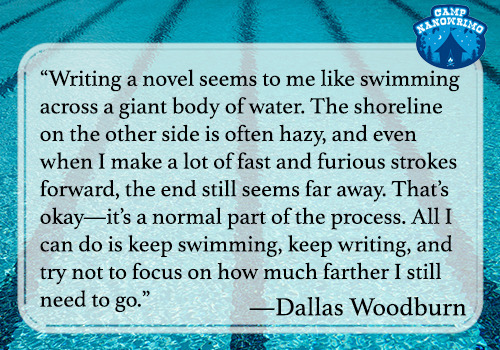
“Writing a novel seems to me like swimming across a giant body of water. The shoreline on the other side is often hazy, and even when I make a lot of fast and furious strokes forward, the end still seems far away. That’s okay—it’s a normal part of the process. All I can do is keep swimming, keep writing, and try not to focus on how much farther I still need to go.”
—Dallas Woodburn is the author of the linked short story collection Woman, Running Late, in a Dress and the novel The Best Week That Never Happened. Her work has been honored with the Cypress & Pine Short Fiction Award, the international Glass Woman Prize, and four Pushcart Prize nominations. She hosts the podcast “Overflowing Bookshelves” and heads the organization Write On! Books that empowers youth through reading and writing endeavors. Dallas lives in the San Francisco Bay Area with her husband and daughter.
Your Camp Care Package is brought to you by Camp NaNoWriMo. Sign up to receive more Camp Care Packages at nanowrimo.org!
Chris Baty's Blog
- Chris Baty's profile
- 63 followers



